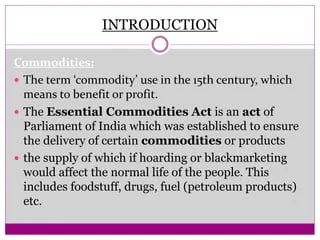Ahmedabad
(Head Office)Address : 506, 3rd EYE THREE (III), Opp. Induben Khakhrawala, Girish Cold Drink Cross Road, CG Road, Navrangpura, Ahmedabad, 380009.
Mobile : 8469231587 / 9586028957
Telephone : 079-40098991
E-mail: dics.upsc@gmail.com

Essential Commodities Act
News: In a bid to cool down the domestic prices of Soya Meal, Government has notified order under the Essential Commodities Act to declare ‘Soya Meal’ as Essential Commodities under the Essential Commodities Act, 1955.
Essential Commodities Act
• The ECA, 1955 was established to ensure the delivery of certain commodities or products, the supply of which, if obstructed due to hoarding or black marketing, would affect the normal life of the people.
• The list of items under the Act includes drugs, fertilizers, pulses, and edible oils, as well as petroleum and petroleum products.The Centre can include new commodities as and when the need arises, and takes them off the list once the situation improves.Additionally, the government can also fix the maximum retail price (MRP) of any packaged product that it declares an “essential commodity”.
• If the Centre finds that a certain commodity is in short supply and its price is spiking, it can notify stockholding limits on it for a specified period.The States act on this notification to specify limits and take steps to ensure that these are adhered to.Anybody trading or dealing in the commodity, be it wholesalers, retailers or even importers are prevented from stockpiling it beyond a certain quantity.
• A State can, however, choose not to impose any restrictions.But once it does, traders have to immediately sell into the market any stocks held beyond the mandated quantity.
• As not all shopkeepers and traders comply, State agencies conduct raids to get everyone to toe the line and
the errant are punished.The excess stocks are auctioned or sold through fair price shops.This improves supplies and brings down prices.
• Items covered under this act include Rice, wheat, atta, gram dal, arhar dal, moong dal, urad dal, masoor, dal, tea, sugar, salt, Vanaspati, groundnut oil, mustard oil, milk, soya oil, palm oil, sunflower oil, gur, potato, onion and tomato.
• The government utilizes the buffer of agri-horticultural commodities like pulses, onion, etc. built under Price Stabilization Fund (PSF) to help moderate the volatility in prices.
Recent amendments:
• In 2020, the EC Act was amended for the stock limit to be imposed only under exceptional circumstances such as famine or other calamities.
• It allowed the centre to delist certain commodities as essential, allowing the government to regulate their supply and prices only in cases of war, famine, extraordinary price rises, or natural calamities.
• The commodities that have been deregulated are food items, including cereals, pulses, potatoes, onion, edible oilseeds, and oils.
• The government regulation of stocks will be based on rising prices, and can only be imposed if there is
o A 100% increase in retail price in the case of horticultural produce and
o A 50% increase in retail price in the case of non-perishable agricultural food items
• These restrictions will not apply to stocks of food held for public distribution in India.

Address : 506, 3rd EYE THREE (III), Opp. Induben Khakhrawala, Girish Cold Drink Cross Road, CG Road, Navrangpura, Ahmedabad, 380009.
Mobile : 8469231587 / 9586028957
Telephone : 079-40098991
E-mail: dics.upsc@gmail.com
Address: A-306, The Landmark, Urjanagar-1, Opp. Spicy Street, Kudasan – Por Road, Kudasan, Gandhinagar – 382421
Mobile : 9723832444 / 9723932444
E-mail: dics.gnagar@gmail.com
Address: 2nd Floor, 9 Shivali Society, L&T Circle, opp. Ratri Bazar, Karelibaugh, Vadodara, 390018
Mobile : 9725692037 / 9725692054
E-mail: dics.vadodara@gmail.com
Address: 403, Raj Victoria, Opp. Pal Walkway, Near Galaxy Circle, Pal, Surat-394510
Mobile : 8401031583 / 8401031587
E-mail: dics.surat@gmail.com
Address: 303,305 K 158 Complex Above Magson, Sindhubhavan Road Ahmedabad-380059
Mobile : 9974751177 / 8469231587
E-mail: dicssbr@gmail.com
Address: 57/17, 2nd Floor, Old Rajinder Nagar Market, Bada Bazaar Marg, Delhi-60
Mobile : 9104830862 / 9104830865
E-mail: dics.newdelhi@gmail.com